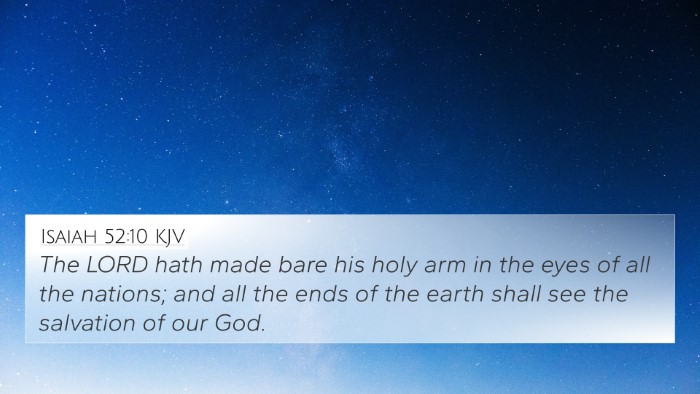Understanding Luke 3:6
Luke 3:6 reads: "And all flesh shall see the salvation of God." This verse holds profound theological significance, reflecting the universal scope of God’s redemptive plan through Christ. Below, we summarize the interpretations from noted public domain commentaries by Matthew Henry, Albert Barnes, and Adam Clarke.
Verse Meaning and Context
This verse appears in the context of John the Baptist's ministry. The quote signifies the coming of salvation that all of humanity will witness. It highlights God's desire for all to engage with the message of salvation, which aligns with numerous biblical themes regarding mercy, grace, and divine outreach to the entire world.
Insights from Commentaries
-
Matthew Henry:
Henry emphasizes that this proclamation is an announcement of joy and hope. He points out that salvation is not limited by ethnicity or social status; it is available to "all flesh," suggesting inclusivity in God's plans.
-
Albert Barnes:
Barnes draws attention to the prophetic nature of this verse. He notes that the phrase reflects the spiritual awakening that comes with Christ's arrival, echoing Isaiah's prophecies about the Messiah who brings redemption.
-
Adam Clarke:
Clarke elaborates that “flesh” here is indicative of mankind in general, signifying the universality of the gospel message. He also points out that this verse signifies God’s initiative in salvation, emphasizing the divine will to reach humanity.
Thematic Connections
Luke 3:6 connects with numerous other scriptures, reflecting broader biblical themes:
- Isaiah 40:5: "And the glory of the LORD shall be revealed, and all flesh shall see it together." This OT passage anticipates the salvation of God, echoed in Luke.
- John 1:29: "Behold the Lamb of God, who takes away the sin of the world!" This shows the universal nature of Christ’s redemptive work.
- Acts 10:34-35: "God shows no partiality, but in every nation anyone who fears him and does what is right is acceptable to him." This reiterates inclusivity in salvation.
- Romans 1:16: "For I am not ashamed of the gospel, for it is the power of God for salvation to everyone who believes." Paul emphasizes the universal reach of the gospel message.
- Revelation 5:9: "And they sang a new song, saying, 'Worthy are you to take the scroll and to open its seals, for you were slain, and by your blood you ransomed people for God from every tribe and language and people and nation.'" This prophecy highlights the culmination of the message in heaven.
- Galatians 3:28: “There is neither Jew nor Greek, slave nor free, male nor female, for you are all one in Christ Jesus.” Paul emphasizes unity under the new covenant.
- Matthew 28:19: "Go therefore and make disciples of all nations..." This commission underscores the universal scope of evangelism.
- Titus 2:11: "For the grace of God has appeared that offers salvation to all people." This supports the universal availability of God’s grace.
- 1 Timothy 2:4: "Who desires all people to be saved and to come to the knowledge of the truth." This verse reflects God’s desire for all to receive salvation.
Cross-Referencing Biblical Texts
To further understand the connections between biblical texts, tools for Bible cross-referencing can be beneficial. A good bible concordance or a bible cross-reference guide can elucidate these links effectively.
How to Use Cross-References
Cross-reference Bible study allows believers to see thematic continuities across scripture. Here is how you can effectively utilize this method:
- Identify Themes: Recognize key themes in verses.
- Find Connections: Use a bible concordance to find verses related to chosen themes.
- Group Verses: Compile verses according to thematic focus.
- Compare Teachings: Analyze how different biblical writers approach similar themes.
Conclusion
Luke 3:6 serves as a pivotal verse highlighting the overarching narrative of salvation in the Bible. By cross-referencing with related scriptures, we gain deeper insights into God's universal outreach and the inclusive nature of His grace. Engaging in comparative Bible verse analysis enriches our understanding of the Scriptures and fosters a more profound appreciation for God’s redemptive work across all of history.











